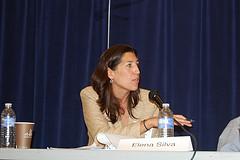 In this direction, Telma Weisz (1999: 53) IN Abreu (2001: 39), take in them to question on what it is wanted to teach for the four initial series and affirms that the pupils must finish 4 Basic series it Ensino dominating the language in efficient way. In other words, they must be capable to produce and to interpret texts, as much for the necessities of day-by-day to write a message, to read the instructions of use of household-electric as to have access to the cultural goods and the full participation in the world scholar, to understand what it is said in a telejornal and to read a book of poetries. She is necessary to read, exactly before dominating the alphabet. The tradition teaches: to alfabetizar is to deal with the written language and to lecionar Portuguese are to train the pupils to represent graphically say it for the combination of letters of the alphabet. In the truth, it is much more of what this.
In this direction, Telma Weisz (1999: 53) IN Abreu (2001: 39), take in them to question on what it is wanted to teach for the four initial series and affirms that the pupils must finish 4 Basic series it Ensino dominating the language in efficient way. In other words, they must be capable to produce and to interpret texts, as much for the necessities of day-by-day to write a message, to read the instructions of use of household-electric as to have access to the cultural goods and the full participation in the world scholar, to understand what it is said in a telejornal and to read a book of poetries. She is necessary to read, exactly before dominating the alphabet. The tradition teaches: to alfabetizar is to deal with the written language and to lecionar Portuguese are to train the pupils to represent graphically say it for the combination of letters of the alphabet. In the truth, it is much more of what this.
To speak and to listen, beyond reading and writing, are actions that allow to produce and to understand texts. It fits to the school to also develop the verbal language of its pupils. It is learned to outside say it of the banks of the school, but in the classroom it is possible you say to show them more adequate and efficient in the different daily situations. This implies to say that, the aspects that we are approaching in this work, had been selected in view of, to contribute with the practical metodolgica of the professor, where we defend the game, as one technique that has much time it is present in the practical one of the alfabetizao, as a didactic resource that was incorporated the process of education of the reading and the natural writing as something, therefore in accordance with the referenciais theoreticians raised, the game is an instrument that since very early is part of the learning of the children, as it affirms Teresa Lleix (2004: 193) that it characterizes them since the Infantile Education, as: the spontaneous games of language and games.